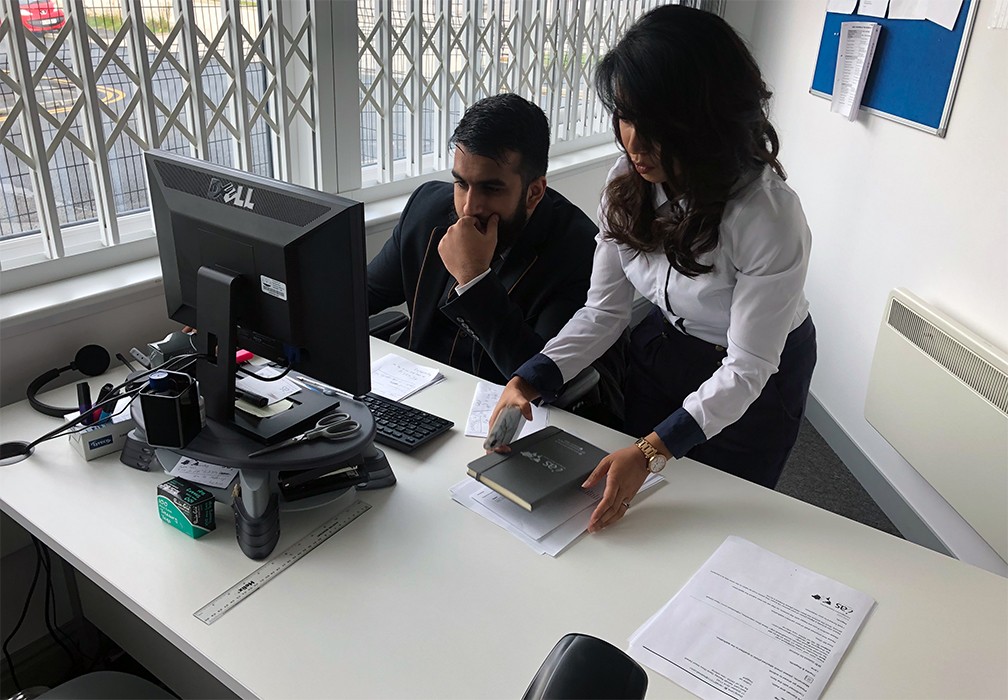Spanish Citizenship for Filipinos
Filipino nationals may become eligible for Spanish citizenship through one of the four main naturalisation pathways while benefiting from shortened residential requirements under the naturalisation by residence pathway.
If you want to gain citizenship in Spain, you will need to understand the requirements and special allowances made for Filipino nationals. Our immigration lawyers at Total Law can help you understand the special requirements for Filipinos who are applying for Spanish citizenship. You can call us today at +44 (0) 333 305 9375 or message us online, for immediate help with your application.
Understanding Citizenship in Spain
Obtaining Spanish citizenship is often considered to be the final step of an immigration journey and could certainly be considered to be a major milestone.
There are four key paths through which you might qualify, such as citizenship by residence, marriage, option, or descent.
Filipino nationals with no previous family history in Spain will usually need to approach the journey towards Spanish naturalisation via the residential pathway, which comes with the additional benefit that Filipino nationals have a lower residential requirement of only two years instead of the usual ten.
Alternative paths include citizenship by marriage or ancestry, which will have different relationship requirements that you must be able to prove.
Page Contents
- Understanding Citizenship in Spain
- Benefits of Holding Dual Citizenship as a Filipino Citizen
- Different Routes to Obtain Spanish Citizenship
- Understanding Permanent Residency and its Relation to Spanish Citizenship
- Requirements for Spanish Citizenship
- Documents Needed When Applying for Spanish Citizenship
- How to get Spanish Citizenship as a Filipino National?
- Timeline for Obtaining Spanish Citizenship as a Filipino
- Spanish Citizenship Application Cost
- DOJ’s Support for Treaty on Philippine-Spanish Citizenship
- Addressing Language Barriers for Filipino Applicants in Spanish Government Agencies
- How Can Total Law Help?
- Frequently Asked Questions

Benefits of Holding Dual Citizenship as a Filipino Citizen
While Spain usually doesn’t allow for dual nationality for international individuals who wish to obtain Spanish citizenship, there is a special agreement with the Philippines, meaning that you may be able to apply for Spanish naturalisation without needing to forfeit your citizenship status in the Philippines.
One of the key benefits is that you will retain all of the benefits you might hold by being a citizen in the Philippines and holding a Filipino passport, while simultaneously getting to benefit from the many positives that come with Spanish citizenship, not least of all the powerful passport and additional freedom and support that you can benefit from while in Spain or elsewhere in the EU, as it will allow you to travel freely in member countries of the European Union, the European Economic Area, or the overall Schengen region.
You should keep in mind that the ability to obtain dual nationality is limited to natural-born citizens of the Philippines so if you were previously naturalised in the Philippines or are a resident without holding citizen status, you may still have to give up your current citizenship status to qualify for Spanish naturalisation.
Different Routes to Obtain Spanish Citizenship
When considering how you might qualify for Spanish citizenship, you will need to discern which available naturalisation route will be most suitable for your circumstances. While citizenship by residence is the most common way to gain citizenship in Spain without any pre-existing connections to the country, you may also qualify through your relationship, your parents, or grandparents.
Spanish Citizenship by Residency
The residency pathway is usually the most attainable but also slowest option for Spanish citizenship, as it involves a lengthy preparation period due to the ten-year minimum residential requirement.
For Filipino nationals, however, this path may be one of the most desirable options, as the nationality agreement between Spain and the Philippines means that the minimum residential requirement has been drastically reduced, meaning that Filipino nationals may be eligible to apply for Spanish naturalisation by residence after only two years of living in the country.
Considering the challenges and limitations that are usually associated with staying in Spain on one of the available national visas which usually make up the first five years of the ten-year residential requirement, the fast track towards citizenship and all the associated freedoms is certainly a desirable offer.
Spanish Citizenship by Marriage
A slightly faster way than citizenship by residence can be found in the citizenship by marriage pathway. If you are married to a Spanish citizen and have been living with them in Spain, you may be eligible for naturalisation after only one year of legal residence. It is important to note here that you will have to prove the ongoing and real nature of your relationship when applying under this pathway.
Spanish Citizenship by Option
Spanish citizenship by option is usually available to children if their parents were born in Spain. While the parents aren’t required to have continued living in Spain, this citizenship nevertheless has some strict limitations regarding eligibility. As such, this naturalisation option is only available to children who are under the age of 20.
Depending on the age of the child, citizenship by option may be applied for by the parent (this applies for applications filed for children who are less than 14 years old) or by the child themselves with adequate legal representation (this applies if the child is 14 years old or older).
In general, you will need to present evidence that your or your child’s birth was registered in Spain, which the parents will need to have done either at birth or in hindsight before the child has turned 18.
Citizenship by option includes parental relationships that were established through adoption or other legal decisions on guardianship, provided that there is adequate reference to prove the existence of this relation. The legal guardian will still need to meet all the typical requirements of the parents, for the child to qualify under this pathway.
Spanish Citizenship by Descent
Spanish citizenship by descent is a slightly less limited alternative to the fairly restrictive citizenship by option. It offers descendants of Spanish nationals a chance to apply for citizenship based on a parent’s or grandparent’s connection to Spain. In general, there are a couple of conditions that apply for your ancestor’s status to qualify you for Spanish citizenship by descent. In general, one of the following should apply:
- Your grandparent was Spanish but left the country before your parent was born and didn’t request Spanish nationality for your parent
- You have a grandmother who was a Spanish national by birth but lost her legal status due to a marriage with a non-Spanish individual before the changes in the 1978 constitution came to pass
- You have a parent or grandparent who gained Spanish nationality retrospectively through historical memory, but you are too old to qualify for nationality by option
Understanding Permanent Residency and its Relation to Spanish Citizenship
Permanent residency in Spain can also be considered the halfway point of the naturalisation by residence pathway. Individuals who are legal residents in Spain on one of the available national visas may apply for permanent residence after five years of living in the country.
It remains valid for longer than a normal visa and offers the opportunity to continue living in Spain without the need to renew the visa as often. Permanent residence is usually used to complete the ten-year residential requirement, at which point most residents choose to apply for Spanish citizenship.
You should note that Spanish permanent residence is an often unnecessary step for Filipino nationals, as you may be eligible to apply for Spanish citizenship directly after only two years of living in the country.
Requirements for Spanish Citizenship
The requirements for Spanish citizenship depend on the application path through which you have qualified. In general, you must meet either the residential minimum or show evidence of an eligible relationship or family connection when applying for Spanish citizenship.
You will also need to pass two Spanish citizenship tests called the DELE A2, which is a Spanish language test, and the CCSE, which tests your knowledge of Spanish culture, history, and the Constitution.
Spain will also consider conduct and character evidence, such as criminal activity when evaluating whether your naturalisation may negatively affect the public interest.
If you are unsure about the Spanish citizenship requirements or how you can show that you are a good candidate for citizenship, you can speak to one of our immigration experts at Total Law today. Simply call us at +44 (0) 333 305 9375 and we will be happy to advise you.
Documents Needed When Applying for Spanish Citizenship
When applying for citizenship in Spain, you will need to submit your application and any supporting evidence to prove that you are indeed eligible for citizenship under your chosen pathway.
Specific documents may be different depending on your individual circumstances, but you will usually need the following:
- Your application form
- Your current passport
- Receipt of payment for your application fees
- Your DELE A2 and CCSE pass certificates
- Details showing you are a natural-born Filipino national (to qualify for the shortened residential requirement, if applicable)
- Your residential register, if applicable
- Financial documents such as bank statements, showing you can support yourself
- Details of any current residential permissions in Spain
- Your marriage certificate, if applicable
- Details about your grandparents or parents, if applying on grounds of descent. You will likely need birth certificates confirming their status in Spain as well as your connection. Evidence in the form of a DNA blood test may also be required
How to get Spanish Citizenship as a Filipino National?
Once you have qualified for Spanish citizenship, you will need to gather the required documents and submit your application.
Depending on where you are, you may do so with your local Spanish immigration authority, which may be the Spanish Embassy in Manila, but commonly, you will already be in Spain when reaching this step which means that you may submit your application to the Spanish Civil Registry or online.
Remember to double-check all of your documents and the application form before submitting your application, as mistakes are harder to correct later and may lead to significant delays or even rejection.
Timeline for Obtaining Spanish Citizenship as a Filipino
Besides the residential requirements that may take up to ten years (or two years for natural-born Filipino nationals), you may need to wait quite a while for a decision on your Spanish citizenship application.
In general, applications may take months or even up to two years.
Spanish Citizenship Application Cost
Spanish citizenship application costs can vary depending on circumstances, but you should generally be ready to pay around €60-100 for citizenship applications.
This is a non-refundable fee and if you are rejected you will have to pay this again, should you decide to try another time.
Additionally, you should factor in the application fee for a Spanish passport which will usually cost around €30.
DOJ’s Support for Treaty on Philippine-Spanish Citizenship
After the Philippines and Spain produced a draft treaty on an agreement for dual nationality for Filipino nationals when acquiring citizenship in an Iberian or Iber-American country (which includes Spain), the Department of Justice spoke in support of this arrangement.
This means that natural-born Filipino nationals are able to maintain their citizenship in the Philippines even when becoming naturalised in Spain.
Additionally, Filipinos who previously had to give up their citizen status in the Philippines due to acquiring naturalisation in one of the now-supported countries may now reclaim their status as Filipino citizens and obtain dual nationality.
Addressing Language Barriers for Filipino Applicants in Spanish Government Agencies
When living in Spain it is important to remember that you will need at least a rudimentary understanding of the Spanish language, not only to fit in locally and truly thrive among Spanish culture, but also to navigate the various aspects of Spanish bureaucracy and legal paperwork including your immigration application processes.
As part of the Spanish citizenship application, you will usually need to complete and pass a language test called the DELE A2, where A2 refers to the language level you are being assessed for, which is generally classed as pre-intermediate.
While this will suffice for the purpose of applying for citizenship, it is highly recommended to continue to learn and practice your use of Spanish as it will only ever benefit your experience and life in Spain.
How Can Total Law Help?
Choosing to apply for Spanish citizenship can be an exciting prospect, especially for Filipino nationals who will be eligible to keep both their citizen status in the Philippines and their new status in Spain.
Nevertheless, it is essential to fully understand the implications of a citizenship application in Spain, not the least to be sure that you do indeed qualify for dual nationality and aren’t about to lose your previous citizenship.
Whether you have already qualified for naturalisation or are planning to take the first steps on your immigration journey, seeking legal support can make the Spanish citizenship application process less stressful.
Our team of immigration lawyers at Total Law has years of experience with Spanish citizenship applications and we will be happy to assist you with any step of the process. You can call us today at +44 (0) 333 305 9375 or message us online, for immediate help with your citizenship journey in Spain.
Advice Package
Comprehensive immigration advice tailored to your circumstances and goals.
Application Package
Designed to make your visa application as smooth and stress-free as possible.
Fast Track Package
Premium application service that ensures your visa application is submitted to meet your deadline.
Appeal Package
Ensure you have the greatest chance of a successful appeal. We will represent you in any case.

The Advice Package
During this untimed Advice Session with our professional immigration lawyers in London, you will receive our comprehensive advice, completely tailored to your needs and your situation.

The Application Package
With our Application Package, your dedicated immigration lawyer will advise you on your application process and eligibility. Your caseworker will then complete and submit your forms to the Home Office on your behalf.

The Fast Track Package
Our Fast-Track Application Package is a premium service for those who need to submit their application in time with their deadlines. Your case will become a top priority for our lawyers and you will benefit from our highest-quality services.

The Appeal Package
By choosing our Appeal Package, you can rely on our lawyers’ legal knowledge and experience to ensure you have the highest chance of a successful appeal. We will also fully represent you in any hearings/tribunals.
Related pages for your continued reading.
Frequently Asked Questions
Unlike residential requirements, Spanish citizenship offers a far more lenient approach to time spent outside of the country, especially if you are a Filipino national with dual citizenship.
You may visit or return to the Philippines or elsewhere in the world, though you should note that it is not recommended to leave Spain for significantly extended stays outside of the EU if you want to keep your citizenship. It is always best to double-check with an immigration lawyer, to make sure that you are covered.

